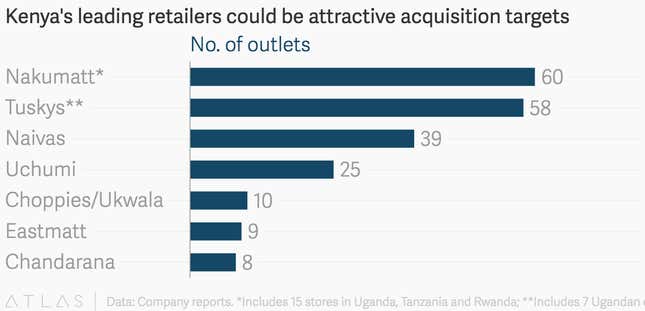Hi, Quartz Africa readers!
Five stories from this week
Mobile data prices in Nigeria are finally falling.
After years of expensive mobile data prices a loosening of regulator restrictions late last year what is hoped to be the first round of price cuts are coming through now. There’s
in Nigeria’s internet usage as telcos compete for more customers with promotions.
More African countries are blocking internet access during elections. As African democracy role model Ghana announced plans to shut down social media for November’s elections, it joins Uganda, Congo-Brazzaville and Chad who did likewise for elections in the last six months. Hilary Matfess examines how blocking social media in particular, could set back democratic progress made on the continent over the last decade.
In rural Ghana, there’s a thin line between your business and your faith.
”Answering God Enterprises”, “Thank You Jesus Hardware”,
“
Christ the Almighty Plumbing
“,
and “My enemies are not God stores”. Those are some of the Christianity-inspired business names that dot the landscape across Ghana’s rural regions.
Yomi Kazeem writes from Kumasi
on how there are more than 10,000 churches and many more branches in the country capturing the close relationship between religion and economics.
Uber’s startup rivals in Africa promise happier drivers and even price haggling. As the ride-hailing service expands in Africa, launching in Kampala and soon to reach Accra and Dar es Salaam, Uber’s rivals are trying to identify weaknesses in the US company’s $62.5 billion armor. Their strategies include offering better term deals to drivers, using local knowledge and pricing to cope with traffic jams and even some good old-fashioned market-style fare bargaining.
Drone images show the “architecture of apartheid” in Cape Town is still firmly in place.
Lily Kuo and Lynsey Chutel spoke
to photographer Johnny Miller about his documentary photography series ‘Unequal Scenes’ that captures aerial shots of the city’s wealthy suburbs and impoverished settlements. Miller wants South Africans to reconsider the inequality they’ve become accustomed to. The reaction to his work has been passionate.
[insertSponsor]
Chart of the week
Global retailers are eyeing East Africa’s growing middle class for expansion.
The world’s largest retailer WalMart, French giant Carrefour and regional players like Botswana’s Choppies have led the charge to take a dip in East Africa’s promising retail sector. But
local market leaders like Nakumatt and Tuskys believe they can hold their own as they welcome the competition.

Other things we liked
Fed up with low returns from tours in Europe and the Americas, African musicians want to play more continental festivals. But there were sounds of discontent at this year’s Bushfire Music Festival in Swaziland. As Setumo-Thebe Mohlomi writes in the Financial Mail, a lack of infrastructure limits African tours and the only willing sponsors are the cultural organizations of former colonial powers.
Is Rwanda’s authoritarian state sustainable? Rwanda is undoubtedly the darling of the development world with its well-run and data-friendly governmental institutions producing evident results. But Laura Seay argues there is a dark side to the rule of president Paul Kagame which has restricted free speech and once held a national survey with millions of Rwandans which only found 10 people opposed to his rule.
Keep an eye on
The uncertainty around the South African economy continues. On Wednesday Jun.8, Statistics South Africa is expected to release GDP figures for the first quarter. Africa’s most advanced economy has been in a state of upheaval for several months now, peaking with the revolving doors of finance ministers in December. But investors breathed a sigh of relief on Friday after credit ratings agency Standard & Poor’s kept the country’s debt status unchanged, avoiding the psychologically harmful ‘junk’ rating—at least for now.
Angola will have important economic news. Expect an interest rate update this week and foreign reserve data later in the week. The source of much of that foreign reserve in recent times has been oil. With the price of oil in the doldrums for much of the year, tough times call for extreme measures. President dos Santos appointed his daughter Isabel, Africa’s richest woman, to run the state oil company. Despite much controversy around the source of her wealth, one of her first tasks at Sonangol will be to increase transparency.
Our best wishes for a productive week ahead. Please send any news, comments, cheap Nigerian mobile data and hopeful Ghanaian prayers to africa@qz.com. You can follow us on twitter at @qzafrica for updates throughout the day.